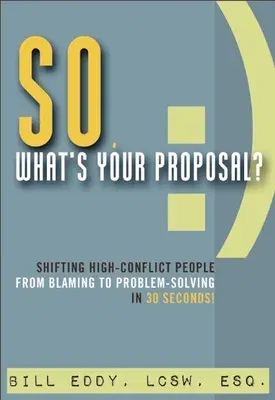Complain! Complain! Complain! Have you ever dealt with high-conflict
people who blame you or others for one problem after another without
taking any responsibility themselves? Don't you feel like wringing their
necks?
Instead, consider the simple method taught in this book for getting them
out of the past and away from blaming everyone else. Get them to quickly
focus on the future, take responsibility and contribute to finding
solutions to problems - including those they created themselves or any
problem.
When people complain and blame you, you don't need to defend yourself or
get angry back. Just calmly say: "So, what's your proposal?" and focus
on teaching the simple 3-step method explained in this book. This method
will help you stay calm and confident, while earning the respect of
those around you - even those who want to blame you!
And blame is abundant these days! Every day dozens, if not hundreds, of
people confront us at work, at the store, in our communities and online.
Nerves get on edge. More and more people get stuck blaming others for
anything that goes wrong. With high-conflict people increasing in
society, with the 24-hour news cycle, and with Twitter, Facebook and the
Internet, we hear constantly about the worst behavior of other people
and dozens of terrible problems. The strong temptation is to react and
blame others back. However, this just feeds the problem.
This book shifts the conversation from the past and blame, to the future
and problem-solving. The book teaches a simple method which can be used
by almost anyone. It will help the reader stay calm and confident, while
also keeping the focus on solving problems, rather than blaming people.
But it takes practice, which is why this book gives so many examples.
The reader will earn the respect of those around him or her. We have
seen it happen over and over again - many times in just 30 seconds.
Another helpful tool to communicate effectively with high-conflict
people is BIFF: Quick Responses to High-Conflict People, Their Hostile
Email, Personal Attacks and Social Media Meltdowns, also by Bill Eddy.

